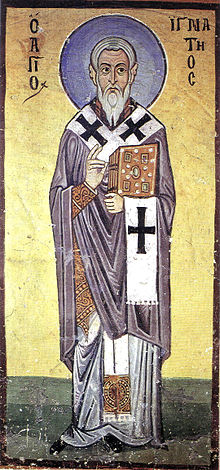Ignatius of Antioch
Appearance

Ignatius of Antioch (Greek: Ἰγνάτιος Ἀντιοχείας) (c. 35 – c. 108 AD), also known as Ignatius Theophorus (Ιγνάτιος ὁ Θεοφόρος), was the third bishop of Antioch. En route to Rome, where he met his martyrdom by being fed to wild beasts, he wrote a series of letters which have been preserved.
Quotes
[edit]- προφυλάσσω δὲ ὑμᾶς ἀπὸ τῶν θηρίων τῶν ἀνθρωπομόρφων.
- I watch over you betimes to protect you from wild beasts in human form.
- 4:2
- I watch over you betimes to protect you from wild beasts in human form.
- καταμάθετε δὲ τοὺς ἑτεροδοξοῦντας εἰς τὴν χάριν Ἰησοῦ Χριστοῦ τὴν εἰς ἡμᾶς ἐλθοῦσαν, πῶς ἐναντίοι εἰσὶν τῇ γνώμῃ τοῦ θεοῦ. περὶ ἀγάπης οὐ μέλει αὐτοῖς, οὐ περὶ χήρας, οὐ περὶ ὀρφανοῦ, οὐ περὶ θλιβομένου, οὐ περὶ δεδεμένου ἢ λελυμένου,οὐ περὶ πεινῶντος ἢ διψῶντος.
- Take note of those who spout false opinions about the gracious gift of Jesus Christ that has come to us, and see how they are opposed to the mind of God. They have no interest in love, in the widow, the orphan, the oppressed, the one who is in chains or the one set free, the one who is hungry or the one who thirsts.
- 6:6-7, as translated by B. D. Ehrman, The Apostolic Fathers, Loeb Classical Library (2003), p. 303
- Take note of those who spout false opinions about the gracious gift of Jesus Christ that has come to us, and see how they are opposed to the mind of God. They have no interest in love, in the widow, the orphan, the oppressed, the one who is in chains or the one set free, the one who is hungry or the one who thirsts.
To the Romans
[edit]- I am God's wheat and I am being ground by the teeth of wild beasts to make a pure loaf for Christ.
- I trust you have had word about those who went ahead of me from Syria to Rome for God's glory. Tell them I am nearly there. They are all a credit to God and to you; so you should give them every assistance. I am writing this to you on the twenty-fourth of August. Farewell, and hold out to the end with the patience of Jesus Christ.
Quotes about
[edit]- At roughly the same time, on the other end of the Roman world in Syria, Ignatius, the bishop of Antioch, was considering and writing about the same topics as Clement. Ignatius had been a disciple of John, and tradition in the Eastern Orthodox Church holds that Ignatius was personally appointed by Peter to be the bishop of Antioch. Like Clement, Ignatius's concern for orthodoxy dominates his writings. Many of the most recognizable features of Christianity are described therein. Ignatius functioned as the most prolific link between the apostles and the early church, and in the words of one scholar, "his testimony must necessarily carry with it the greatest weight and demand the most serious consideration." All of Ignatius's surviving letters were written on a journey to Rome, where he would meet death by being torn to pieces by lions. Consequently, his letters to the churches around the Roman world are wrought with a desperate love and concern for his brothers and sisters. One of Ignatius's main themes is a pleading that the churches would reject the heresies that were creeping into the church. "I entreat you... not to nourish yourselves on anything but Christian fare, and have no truck with the alien barbs of heresy," he wrote. Rejection of heresy included shunning those who claimed to be Christians but adhered to false teaching: "You must keep away from these men as you would from a pack of savage animals, they are rabid curs who snap at peoples unawares, and you need to be on guard against their bites, because they are by no means easy to heal." Ignatius also emphasized the importance of the Eucharist (the Lord's Supper), declaring it the "medicine of immortality." As one who was personally instructed by at least one of the apostles, he had much to say on the subject.
- William Bennett, Tried by Fire: The Story of Christianity's First Thousand Years (2016), ISBN 978-0-7180-1871-9
- The first-century Christian writer Ignatius called for an abolition of warfare. This would happen, according to him and other Christian writers, once the world embraced the teachings of Jesus Christ—to love one's enemies, to do good even to those who do evil, to respond to evil with goodness. Such determined love and goodness was not meant to be pacifistic but a program for actively fighting evil. Given their stance against soldiers and soldiering, even against police work, it is striking that Christians sought and got converts among the Roman Legion. Some historians believe that it was converted Roman soldiers who first brought Christianity to Britain.
- Mark Kurlansky, Nonviolence: The History of a Dangerous Idea (2006), ISBN 9780679643357

